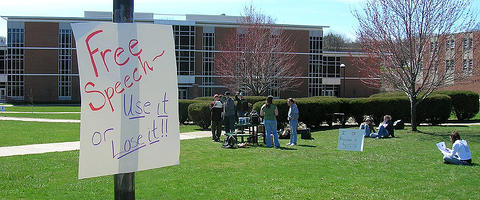
Photo by Brian Turner
Anti-piracy bills are tirelessly being pushed by government lobbyists to limit certain website that you and I may otherwise enjoy currently, acting as a mousetrap for free speech.
You may be wondering how internet censorship will affect you (the average Web surfer). The answer is that anti-piracy piracy bills, such as SOPA (Stop Online Piracy Act) and PIPA (Protect IP Act), could potentially affect public web surfing and take down or limit video streaming sites like ‘YouTube’
They could also affect payment facilitators such as PayPal. This could hinder possible purchases to your favorite websites if the government deems them as having copyrighted material listed. And if that isn’t enough, search engines would be ordered to have your popular web links removed from the public’s eyes.
Two Viewpoints, One Resolution
There are two sides to this controversial argument. Group one represents a large part of the public population that feels the government and federal laws would be infringing on our privacy by restricting what they feel the public is allowed to view and trying to micromanage our freedom of speech rights.
This group feels this is just another trickle-down effect of government control by allowing empowered corporations to censor the internet. Some say that even though these proposed laws are not fully intended to block access to our use of free speech and that the collateral damage would be enough to allow for tens of thousands of websites pages to be affected, instead of targeting just one single webpage. Critics of group one say that over 60% of the Democrats in the Senate are in favor of the SOPA and PIPA bills.
Group two represents the supporters of SOPA and PIPA and is largely made up of CEO media companies, such as TV networks, movie studios and record labels. These advocates feel they are not getting their fair share of the pie and have already tried suing copyright infringing sites with no success.
The one thing that is for sure is there can only be one hardline resolution and no happy medium when it comes to these types of proposed laws. Even the White House has weighed in with their concerns about the effect this could have on the structure of the World Wide Web. Both bills have been shelved for now, but there will most likely be alternative bills waiting in the wings for the next bunch of supporters or opponents to take issue with.
Facts about the Fair Use Doctrine and a Healthy Economy
Regardless of your viewpoint about copyright law, the fair use doctrine is actually useful and has its place in downturned economy. It not only helps search engines provide consumers with various information, but it also helps to feed large amounts of funds into our economy. It does this by allowing fair use entertainment related companies to broadcast audio and video, safeguards broadcasting jobs, and is the core of today’s internet success.
